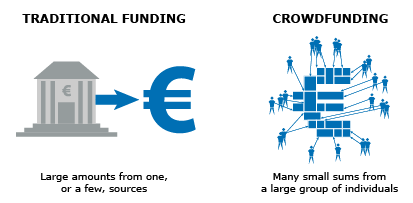Crowdfunding is a way of raising money to finance projects and businesses. It enables fundraisers to collect money from a large number of people via online platforms.

Crowdfunding is most often used by startup companies or growing businesses as a way of accessing alternative funds. It is an innovative way of sourcing funding for new projects, businesses or ideas.
It can also be a way of cultivating a community around your offering. By using the power of the online community, you can also gain useful market insights and access to new customers.
This guide is aimed at entrepreneurs, businesspeople and companies, especially small and medium enterprises. If you are thinking about ways of financing a new business or idea, or have heard about crowdfunding and want to learn more, you may find this guide useful.
How does crowdfunding work?
Crowdfunding platforms are websites that enable interaction between fundraisers and the crowd. Financial pledges can be made and collected through the crowdfunding platform.
Fundraisers are usually charged a fee by crowdfunding platforms if the fundraising campaign has been successful. In return, crowdfunding platforms are expected to provide a secure and easy to use service.
Many platforms operate an all-or-nothing funding model. This means that if you reach your target you get the money and if you don’t, everybody gets their money back – no hard feelings and no financial loss.
There are a number of crowdfunding types which are explained below. This guide provides unbiased advice to help you understand the three most common types of crowdfunding used by profit-making SMEs and startups: peer-to-peer, equity and rewards crowdfunding.
Main types of crowdfunding
- Peer-to-peer lending
The crowd lends money to a company with the understanding that the money will be repaid with interest. It is very similar to traditional borrowing from a bank, except that you borrow from lots of investors.
- Equity crowdfunding
Sale of a stake in a business to a number of investors in return for investment. The idea is similar to how common stock is bought or sold on a stock exchange, or to a venture capital.
- Rewards-based crowdfunding
Individuals donate to a project or business with expectations of receiving in return a non-financial reward, such as goods or services, at a later stage in exchange of their contribution.
- Donation-based crowdfunding
Individuals donate small amounts to meet the larger funding aim of a specific charitable project while receiving no financial or material return.
- Profit-sharing / revenue-sharing
Businesses can share future profits or revenues with the crowd in return for funding now.
- Debt-securities crowdfunding
Individuals invest in a debt security issued by the company, such as a bond.
- Hybrid models
Offer businesses the opportunity to combine elements of more than one crowdfunding type.
